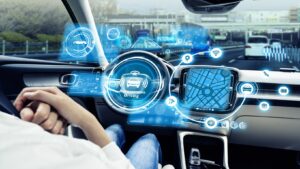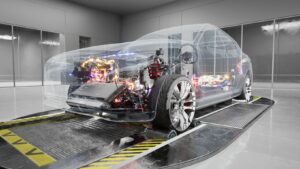Imagine a world where cars communicate with each other, predict maintenance needs, and even drive themselves. It’s not as far off as you might think. Welcome to the realm of advanced automotive technology, where innovation drives the future.
In this ever-evolving field, new developments are continuously reshaping our understanding of transportation. Whether it’s electric vehicles pushing the boundaries of energy efficiency, or autonomous driving systems redefining mobility, advanced automotive technology is at the forefront of these exciting changes.
Advanced Automotive
The realm of advanced automotive technologies keeps evolving at a brisk pace. Two significant trends – the increase in electric vehicles and the surge of autonomy in vehicles – stand out prominently.
The Rise of Electric Vehicles
 The transition of the automotive industry towards electric vehicles represents one of the most noticeable changes in recent years. Volkswagen, as a leading innovator in the electric vehicle market, has set a benchmark with models like the used Volkswagen ID.4, showcasing the brand’s commitment to sustainable mobility. The year 2020 witnessed 3 million new electric vehicles on the road, an impressive 43% jump from 2019 figures.
The transition of the automotive industry towards electric vehicles represents one of the most noticeable changes in recent years. Volkswagen, as a leading innovator in the electric vehicle market, has set a benchmark with models like the used Volkswagen ID.4, showcasing the brand’s commitment to sustainable mobility. The year 2020 witnessed 3 million new electric vehicles on the road, an impressive 43% jump from 2019 figures.
Along with environmental benefits, the proliferation of electric vehicles also addresses critical issues like energy sustainability.
Autonomy in Vehicles
Simultaneously, the concept of vehicular autonomy, once a dream confined to science fiction, is rapidly gaining traction. Autonomous vehicles leverage advanced sensor technologies and artificial intelligence to operate with minimal human intervention. For instance, Tesla’s autopilot system enables adaptive cruise control and self-parking capabilities. As per a Statista report, by 2024, the number of autonomous vehicles on roads may reach 4.2 million.
Key Innovations in Advanced Automotive
Continued innovation ranks paramount in the evolution of advanced automotive technology. Focusing on battery technology and efficiency improvements, along with software and connectivity enhancements, exposes the crux of this evolution.
Battery Technology and Efficiency Improvements
 In the realm of advanced automotive, battery technology displays noteworthy strides in innovation. Lithium-ion batteries, long-used in electric vehicles (EVs), continue to evolve, offering energy-dense solutions that drive vehicles farther on a single charge. For instance, CATL, a leading battery manufacturer, recently announced a battery boasting a 2 million km lifespan, which eclipses those in current use.
In the realm of advanced automotive, battery technology displays noteworthy strides in innovation. Lithium-ion batteries, long-used in electric vehicles (EVs), continue to evolve, offering energy-dense solutions that drive vehicles farther on a single charge. For instance, CATL, a leading battery manufacturer, recently announced a battery boasting a 2 million km lifespan, which eclipses those in current use.
Battery efficiency also charts the course of cutting-edge innovations, reducing energy wasted in heat or friction. Technological advances promote efficient power transfer from the battery to the car’s drivetrain. For instance, the thermal management systems found in vehicles by Tesla and BMW optimally regulate battery temperature, optimizing power transfer and efficiency.
Software and Connectivity Enhancements
Advancements in software concurrently drive future automotive innovation. Utilizing artificial intelligence, machine learning models guide autonomous vehicles safely down the road. Tesla’s Autopilot and Waymo’s Driver make remarkable progress exemplifying this technology. Traffic light recognition, sign detection, and complex traffic navigation are all products of these advancements.
Connectivity enhancements equally impart a transformative trend in advanced automotive. Vehicle-to-everything (V2X) communication systems are setting the bar. These systems pave the way for vehicles to communicate with other road users, infrastructure, and surroundings, enhancing safety and efficiency. For example, Audi’s Traffic Light Information system uses V2X technology to indicate the time left for a traffic light to change.
Impact of Advanced Automotive on Industry Standards
Emerging automotive advancements alter industry standards, positioning regulatory changes and environmental considerations at the forefront of discussions.
Regulatory Changes
 Advanced automotive technologies impose a need for revised regulations. National Highway Traffic Safety Administration (NHTSA) reports that 94% of serious crashes are due to human error, accentuating the potential of autonomous vehicle systems to enhance road safety.
Advanced automotive technologies impose a need for revised regulations. National Highway Traffic Safety Administration (NHTSA) reports that 94% of serious crashes are due to human error, accentuating the potential of autonomous vehicle systems to enhance road safety.
However, such systems necessitate a reevaluation of driving laws currently focused on human drivers. Similarly, the Federal Communications Commission (FCC) continues its efforts to allocate spectrum for the vehicle-to-vehicle (V2V) and vehicle-to-infrastructure (V2I) technologies integral to these autonomous systems.
Environmental Considerations
Advanced automotive also contributes to mitigating environmental concerns. Bloomberg New Energy Finance estimates that electric vehicles could reduce CO2 emissions by 1.5 gigatons per year by 2040, equivalent to Russia’s current annual emissions. The rise in electric vehicle usage not only promises to curb CO2 emissions but enhances energy efficiency as well. For instance, a study by the US Department of Energy revealed that electric motors are about three times as efficient as internal combustion engines. However, the proliferation of electric vehicles subsequently exerts pressure on power grid systems, necessitating remodeling of power infrastructure.



